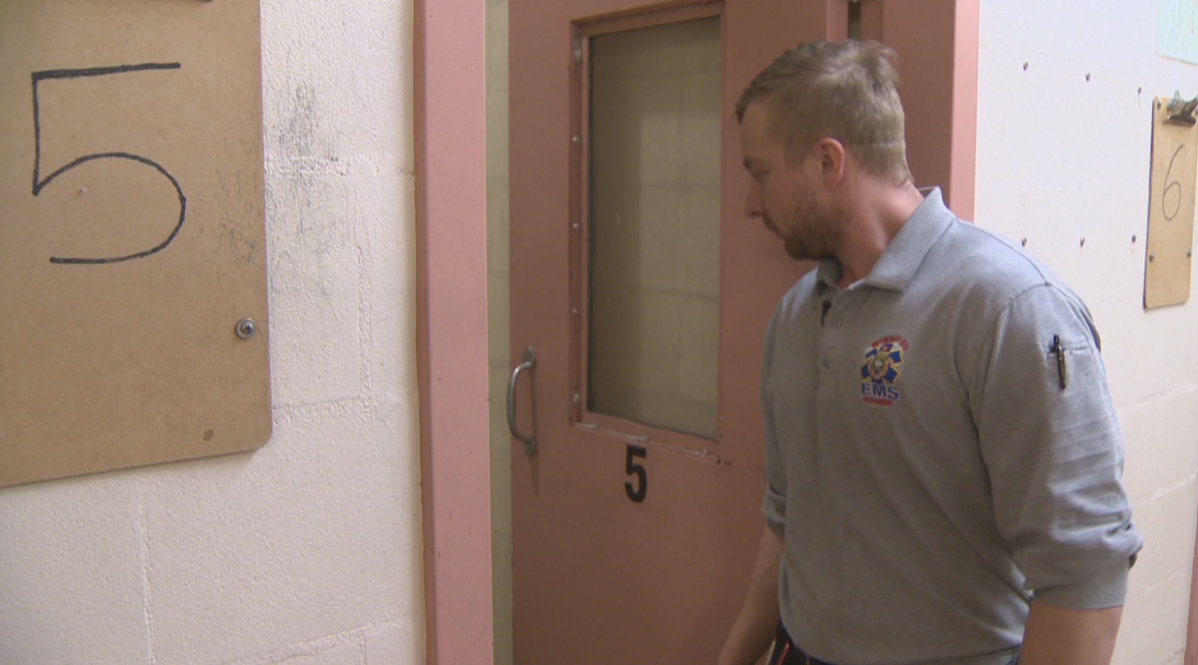
This is the second in a four-part series on alcohol and the dark side of the impact it has on Manitoba communities. Tune in to 680CJOB and watch Global News Winnipeg for more.
Part 4: To come March 14
Danny Kustra has been stationed at Main Street Project‘s IPDA (Intoxicated Person’s Detention Area), commonly known as the “Drunk Tank” for more than five years.
“If this didn’t exist we would often times run out of ambulances in the city just dealing with alcohol,” Kustra said
He believes the city’s emergency rooms would be “flooded with intoxicated people” if the IPDA didn’t exist.
The facility has 21 enclosed rooms. Each room includes a foam pad to lay on, a bottle of water, a metal grate for bodily fluids, and a security camera.
Patients are brought to IPDA by the Winning Fire Paramedic Service, Cadets, or Winnipeg Police when they’re deemed to be too intoxicated to remain in a public setting.
Full time paramedics were first assigned to the facility in 2009.

Get weekly health news
“Paramedics were coming to this facility over 600 times per year, by ambulance back when we first came here,” Ryan Sneath, the first paramedic to become employed at IPDA, said.
Ten years later, Sneath now serves as the Winnipeg Fire Paramedic Service’s Assistant Chief of Paramedic Operations.
In 2011, IPDA became a full time program where paramedics where staffed around-the-clock to deal with an increase in the amount of overnight IPDA visits.
Today, IPDA employs eight full time staff members along with four part time staff members, including the facility’s Manager, Director and Supervisor.
In addition to that, two paramedics are working there at all times.
“The paramedics here are the highest-trained paramedics in our system,” Sneath said.
“They have the ability to treat (patients) immediately but they also have the ability to divert these patients to more appropriate destinations.”
The WFPS responded to 5,894 alcohol related calls in 2018, and 6,389 in 2017.
Health Sciences Center Emergency Room Doctor and WFPS Medical Director Rob Grierson says IPDA continues to make a huge impact on the medical system.
“The burden on the emergency system is less for sure, but it’s not about the system. It’s about the individuals,” Dr. Grierson said.
“The individuals are getting far better care, and they’re been looked after much more thoroughly at Main Street Project.”
Despite the fact Main Street Project is taking patients off the hands of the city’s emergency rooms, ERs are still dealing with alcohol related issues on a daily basis.
“In 20 years at the hospital, I’ve never had a shift where alcohol hasn’t been presented in some capacity,” Grierson said.
Public Perception
“I think there’s a lot of fear behind it, and I think that fear is likely based on a lack of understanding or a lack of perspective,” Ryan Sneath said.
What you probably don’t know is that detention area sees a variety of patients on any given night.
“It’s people from all walks of life, and every part of the city. It could be after a Jets game, someone outside who’s used a solvent, after a wedding, or a bachelor party,” Talh East, Main Street Project’s Detoxification Director says.
Danny Kustra hopes that by simply getting the message out about how IPDA is helping the community, the public’s perception starts to change.
“For a lot of them, we’re their only source of health care they come to us and choose to come to us rather they rather than emergency or a doctors office.”
The five-year IPDA paramedic says he’s glad he chose to be apart of the program at a point not a lot of other paramedics were interested in.
“We’ve developed that trust with them — which to me is kind of an honor.”
Manitoba Intoxication Laws
Another reason IPDA is so valuable in Winnipeg, is because of how laws around public intoxication are laid out.
Manitoba is the only province in Canada where you cannot be arrested and charged for public intoxication.
“In every other province you are charged with public intoxication and it requires a judge to release you from public intoxication once you regain sobriety,” Sneath explains.
Without facilities like IPDA, people would be held in police holding cells and even emergency rooms.
The Manitoba Intoxicated Persons Detention Act says the patient shall be released when they “recover sufficient capacity to remove yourself without danger to yourself or others.”
“You are detained until you regain sobriety and it’s just for a safe place for you to be and sober up and then you’re released,” Sneath concluded.
Repeat Visitors
The IPDA sees more than 11,000 people yearly, most of them treated at IPDA over the course of the last year have only had one visit to the facility.
About 74 per cent of IPDA patients only had one stay at the facility from February 2018 to February 2019, while 14 per cent have had two stays, and 12 per cent have had three or more stays.
Main Street Project’s Detoxification Director Tahl East said they try to encourage each patient that comes through IPDA to enter Main Street Project’s Detoxification Program.
“There’s no shame in trying detox 15 times if they’ve been in IPDA 17 times,” East said.
She continued to say a rapport unlike no other is built with repeat IPDA visitors, which sometimes leads to a healthy recovery.
“It protects 11,000 individuals every year,” East said.
“They would be in jail — or maybe worse — if we didn’t have IPDA in Manitoba.”
















Comments